Click here to view IISD Executive Summary and Full Report
Please Note: Concrete Atlantic is not responsible for content information
Among its conclusions, the study found that up to 72% of carbon emissions from wood products may not be accounted for in commercial Life-cycle Assessments (LCA). When these emissions are taken into account, concrete’s embodied carbon footprint could be up to 6% less intensive than that of wood products, challenging the assumption that wood materials are inherently less carbon intensive than steel or concrete.
LOGGING SCARS,Wildland League, December 2019,
Further evidence about the hidden carbon footprint of wood was released by Toronto- based Wildlands League. Titled “Logging Scars,” the research found that the wood industry’s reforestation efforts are significantly less successful than assumed.
BOREAL LOGGING SCARS MAP, Wildlands League, July 2020
Other Sources and References:
- Canada’s managed forests have turned into super-emitters, and 2018 set a record, National Observer, June 2020,
- Wooden high-rises don’t guarantee reduced emissions, Peter Fairley, Crosscut, May 2020,
- The Logging Loophole: How the Logging Industry’s Unregulated Carbon Emissions Undermine Canada’s Climate Goals report, NRDC, Environmental Defence, Nature Canada, July 2020
- To save our climate we need taller trees not taller wooden buildings, John Talberth, Center for Sustainable Economy, February 2020,
- Canada uses ‘creative accounting’ to push forest emissions off the books, Barry Saxifrage, The Energy Mix, April 2020,
- Clearcutting the planet’s carbon pools, Tzeporah Berman, Corporate Knights, May 2020,
- Canada is failing to track the true climate cost of clearcut logging in boreal: report, Matt Simmons, The Narwhal, July 2020,
- Here’s what’s happening to BC forests, David Broadland, Focus on Victoria, August 2020,
- CO2 emissions from forestry are a surging climate threat. Ottawa needs to act, Barry Saxifrage, National Observer, November 2020,
- Carbon Sequestration in Forest Based Products,, Pacific Northwest Building Resilience Coalition, 2018, Globe Advisors.
- The Great American Stand, US Forests and the Climate Emergency, Dogwood Alliance, 2017, Executive Summary,
Resources on concrete carbonation
- (Re)Carbonation, A little-known fact about cement is that it is a carbon sink!, CEMBUREAU,
- Substantial global carbon uptake by cement carbonation, Nature Geoscience, November 2016,
![]() RECOMMENDED GUIDELINE FOR ENVIRONMNTAL MANAGEMENT PRACTICES
RECOMMENDED GUIDELINE FOR ENVIRONMNTAL MANAGEMENT PRACTICES
PROMOTIONAL MATERIAL
Please feel free to ultilize these publications for your own use. High resolution (print quality) artwork is available by calling the ACA Office. 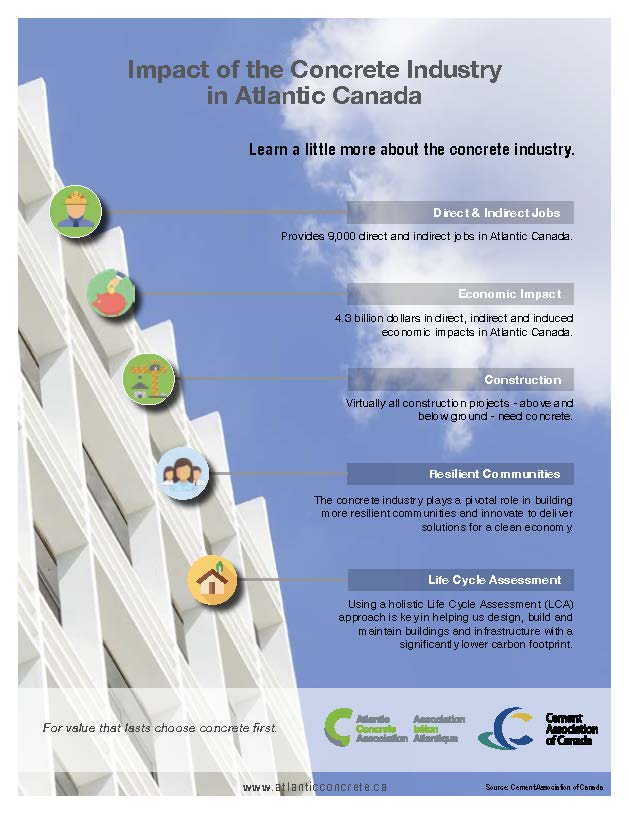

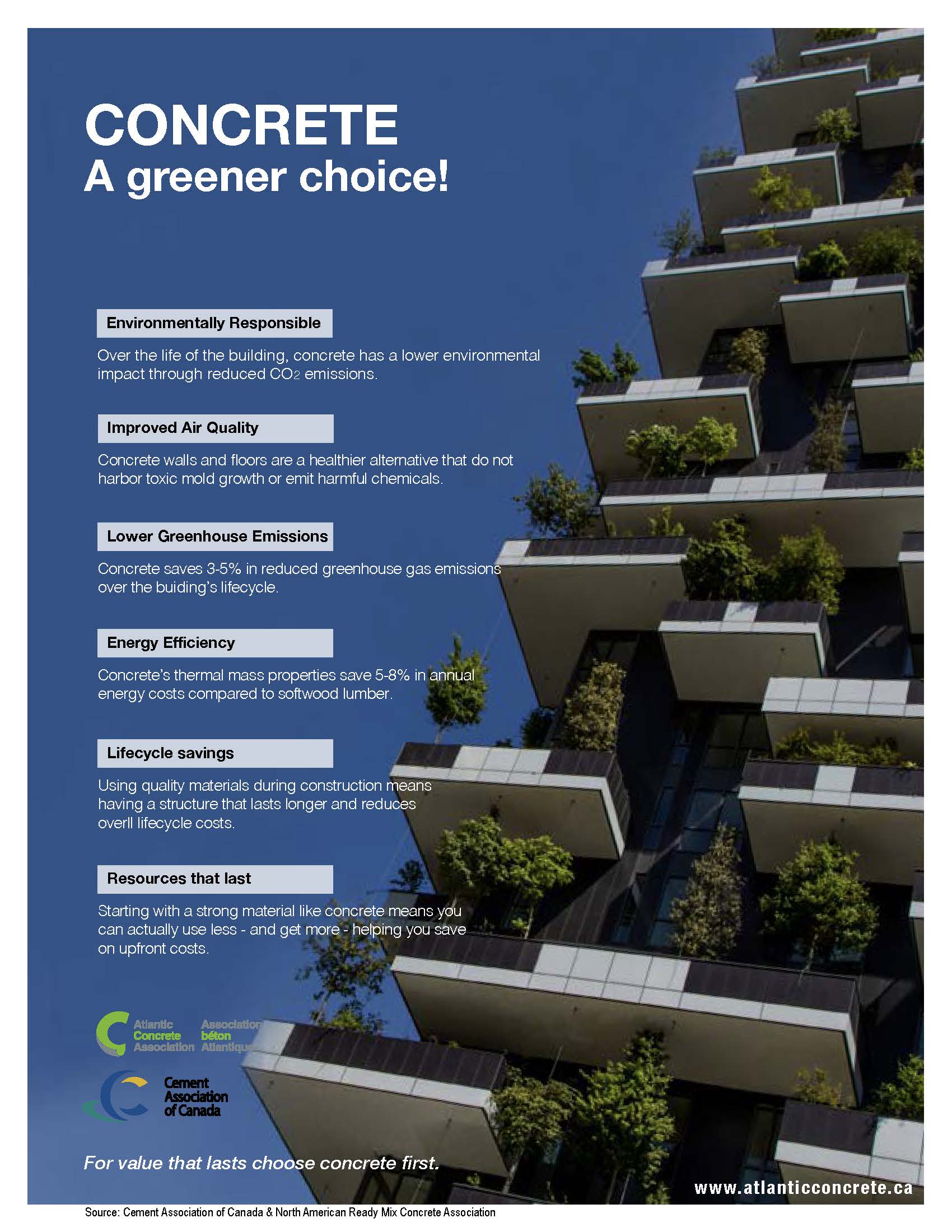
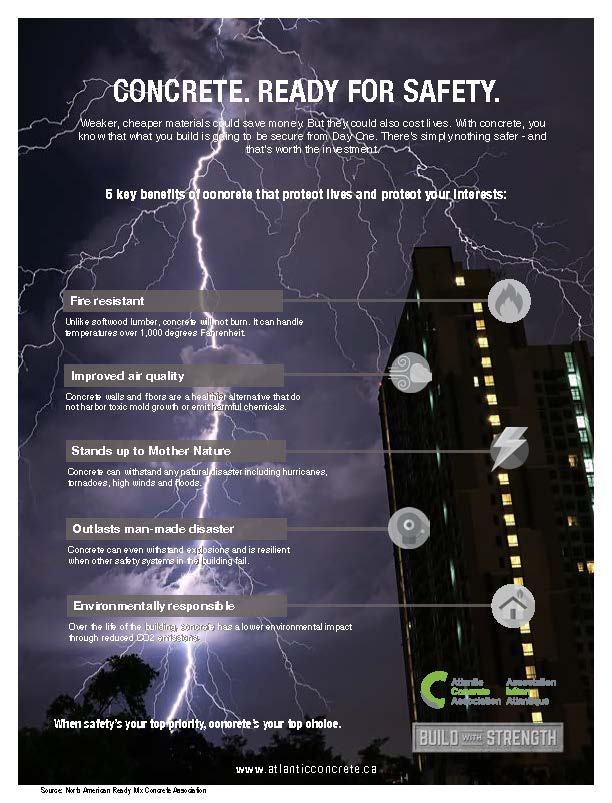
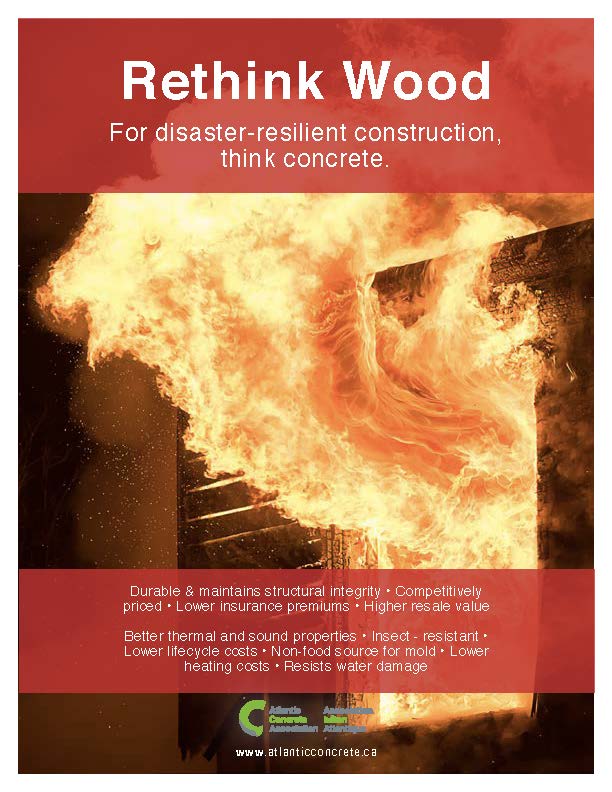
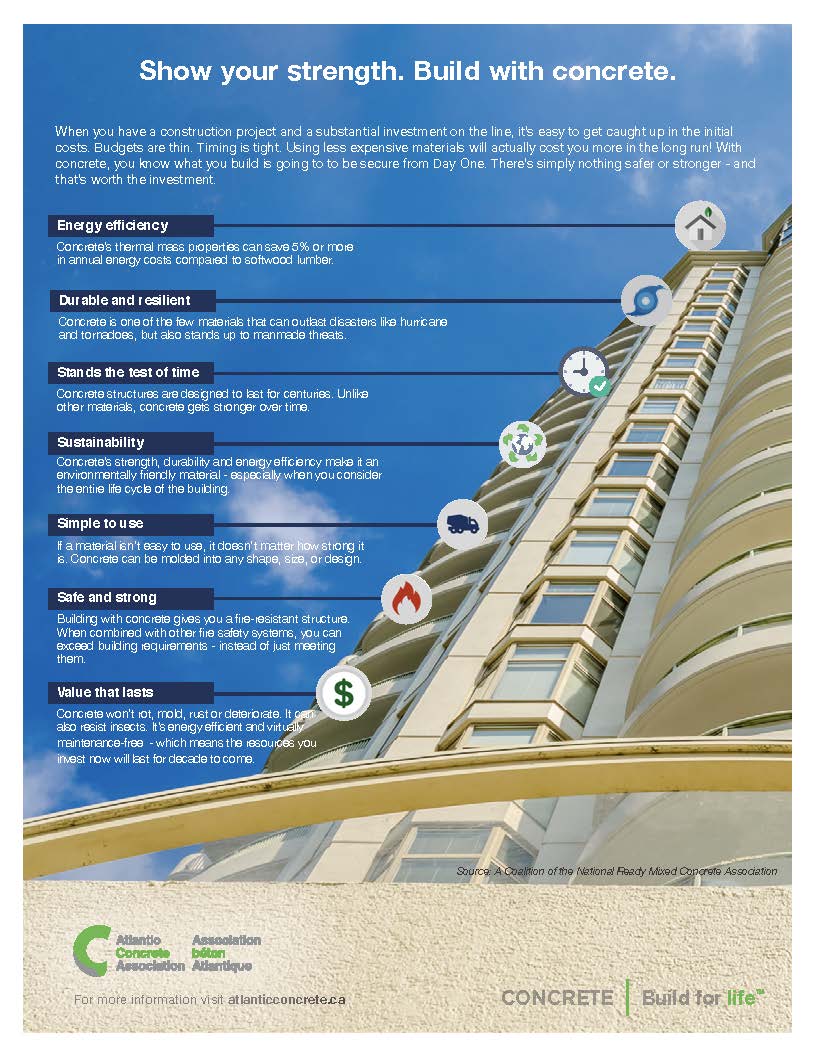
CARBON SEQUESTRATION IN WOOD BUILDING PRODUCTS, PRESENTATION BY BRENT McGRATH
Watch Presentation
RESILIENCE: ADAPTING TO CLIMATE CHANGE - DR. BLAIR FELTMATE
Watch Presentation
CCEPA: HISTORY OF SUSTAINABLE DEVELOPMENT - DR. BLAIR FELTMATE
Watch Presentation
CatIQ's CATASTROPHE CONFERENCE - DR. BLAIR FELTMATE
Watch Presentation
CONCRETE MIXER DRIVER RECRUITMENT VIDEO
Watch Short Video
Watch Long Video
A DAY IN THE LIFE OF A READY MIX DRIVER
Watch Short Video
Watch Long Video
NEW - CPCI ENERGY GUIDE![]() Read the Guide
Read the Guide
ENVIRONMENTAL PRODUCT DECLARATION DOCUMENT - for the Canadian Ready-Mixed Industry
Download the EPD document
STUDY OF INSURANCE COSTS FOR MID-RISE WOOD FRAME AND CONCRETE RESIDENTIAL BUILDINGS![]() Read the Summary
Read the Summary![]() Read the full report
Read the full report
STUDY OF INSURANCE COSTS FOR MID-RISE WOOD FRAME AND CONCRETE RESIDENTIAL BUILDINGS![]() Read the Executive Summary
Read the Executive Summary![]() Read the full Report
Read the full Report
NOTICE OF CHANGE FOR PLANT CERTIFICATION CSA STANDARD A23.1-14 - APRIL, 2016
Delivery Ticket Requirements ![]() mem_aca_changes_a231_deliveryslip_201604191.pdf
mem_aca_changes_a231_deliveryslip_201604191.pdf
CONCRETE EXPOSURE CLASSES![]() Download the report
Download the report
SLAB SURFACE PREVENTION REPAIR![]() Download the report
Download the report
SUSTAINABILITY, WOOD AND THE ENVIRONMENT![]() Download the report
Download the report
CANADIAN CEMENT INDUSTRY SUSTAINABILITY REPORT![]() ENGLISH_FINAL_2010_SD_Report_Mar17.pdf
ENGLISH_FINAL_2010_SD_Report_Mar17.pdf
MATERIAL SELECTION MATTERS SEMINAR – PRESENTED BY JOHN STRAUBE, PHD., P.ENG., RDH BUILDING SCIENCE LABORATORIES
This seminar presentation provides up-to-date building science information about material selection and how to apply building science principles to construct resilient, durable, energy efficient and healthy buildings.
View the presentation…
LIFE CYCLE ASSESSMENT OF CONTRMPRA (PORTLAND-LIMESTONE CEMENT) AND REGULAR CEMENT
AN ENVIRONMENTAL LIFE CYCLE ASSESSMENT OF PORTLAND-LIMESTONE AND ORDINARY PORTLAND CEMENTS IN CONCRETE
A cradle-to-gate Life Cycle Assessment study of both Portland-limestone cement and ordinary Portland cement released by Athena Sustainable Materials Institute in 2014 demonstrates that Portland-limestone cement has lower impacts in all indicators and is about 10% better in greenhouse gas emissions. ![]() Read the technical brief
Read the technical brief
CLIMATE CHANGE ADAPTATION & INFRASTRUCTURE
CAC OPED ON FACING THE CHALLENGE OF ADAPTING TO CLIMATE CHANGE IN CANADA
LIFE CYCLE ASSESSMENT (LCA) – BUILDINGS
AN ENVIRONMENTAL LIFE CYCLE ASSESSMENT OF PORTLAND-LIMESTONE AND ORDINARY PORTLAND CEMENTS IN CONCRETE
A cradle-to-gate Life Cycle Assessment study of both Portland-limestone cement and ordinary Portland cement released by Athena Sustainable Materials Institute in 2014 demonstrates that Portland-limestone cement has lower impacts in all indicators and is about 10% better in greenhouse gas emissions. ![]() Read the technical brief
Read the technical brief
ATHENA INSTITUTE OFFERS NEW GUIDE TO LCA CREDITS IN GREEN BUILDING PROGRAMS![]() Read the guide
Read the guide ![]() Read the report
Read the report
DETAILED COST ANALYSIS BETWEEN WOOD AND CONCRETE CONSTRUCTION ![]() Read Report.pdf
Read Report.pdf
LIFE CYCLE ASSESSMENT OF PRECAST CONCRETE COMMERCIAL BUILDINGS
Athena Sustainable Institute, Morrison Hershfield, Venta, Glaser & Associates, CPCI![]() Read the report
Read the report
LIFE CYCLE ASSESSMENT FOR SUSTAINABLE DESIGN OF PRECAST CONCRETE COMMERCIAL BUILDINGS IN CANADA
Athena Sustainable Institute, Morrison Hershfield, CPCI![]() Read the report
Read the report
LIFE CYCLE ASSESSMENT (LCA) OF BUILDINGS
Concrete Sustainability Hub | Massachusetts Institute of Technology![]() Read the Report
Read the Report
MIT CONCRETE SUSTAINABILITY HUB![]() Visit the Concrete Sustainability Hub
Visit the Concrete Sustainability Hub
LIFE CYCLE ASSESSMENT (LCA) - PAVEMENTS
ATHENA SUSTAINABLE MATERIALS INSTITUTE RELEASES UPDATE TO ITS PAVEMENT LCA TOOL WITH A NEW NAME AND MANY NEW FEATURES
The North American pioneer in construction sector LCA today released Version 2.1 of ‘Pavement LCA’, formerly known as the Impact Estimator for Highways, with a variety of new features including US locations and sample projects. ![]() Read more and access the software
Read more and access the software
ATHENA SUSTAINABLE MATERIALS INSTITUTE IMPACT ESTIMATOR FOR HIGHWAYS - VERSION 2.0
The Athena Sustainable Materials Institute Impact Estimator for Highways provides quick and easy Life Cycle Assessment results for Canadian roadways. ![]() Read more and access the software
Read more and access the software
EQUIVALENT PAVEMENT STRUCTURAL DESIGN MATRIX AND LCCA FOR MUNICIPAL ROADWAYS
Updated reports for municipal roadways are now available:
• Nova Scotia 2013 (updated 2015)
• Ontario 2011 (updated 2015)
• Quebec 2012 (updated 2015)
• Alberta 2015
• British Columbia 2016
LIFE CYCLE ASSESSMENT (LCA) OF HIGHWAY PAVEMENTS
Concrete Sustainability Hub | Massachusetts Institute of Technology![]() Read the Report
Read the Report
ATHENA SUSTAINABLE MATERIALS INSTITUTE - A LIFE CYCLE PERSPECTIVE ON CONCRETE AND ASPHALT ROADWAYS: EMBODIED PRIMARY ENERGY AND GLOBAL WARMING POTENTIAL
MIT CONCRETE SUSTAINABILITY HUB![]() Visit the Concrete Sustainability Hub
Visit the Concrete Sustainability Hub
NATIONAL CONCRETE PAVEMENT TECHNOLOGY CENTER
Visit the National Concrete Pavement Technology Center
MANUFACTURING PROCESS RESEARCH
ALTERNATIVE ENERGY SOURCES IN CEMENT MANUFACTURING – A SYSTEMATIC REVIEW OF THE BODY OF KNOWLEDGE
Network for Business Sustainability, 2011![]() Read the Report
Read the Report
THE CEMENT SUSTAINABILITY INITIATIVE 2012 REPORT
World Business Council for Sustainable Development
In 2002, the founding members of the World Business Council for Sustainable Development’s Cement Sustainability Initiative (CSI) published their Agenda for Action. It sets out a program of work, focusing on certain specific areas. In each area, there are two kinds of action: joint projects, on which a group of companies will work together to tackle a specific environmental or social issue; and individual actions, which will be implemented by each company in its own operations (including target setting and performance reporting), applying both innovation and best practice.
This Progress Report provides a snapshot of CSI’s achievements over the past ten years, as well as an outlook onto the future issues the cement industry will need to tackle, how the CSI and its member companies are planning to respond to changing and new sustainability challenges.![]() Read the Report
Read the Report


